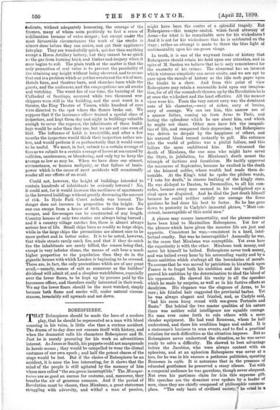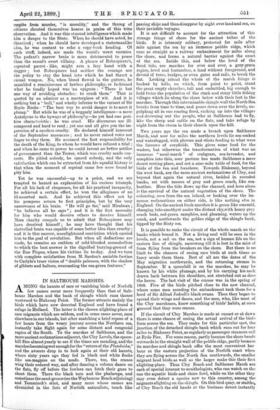ROBESPIERRE. might have been the centre of a splendid trag
). But Robespierre—this meag,re-souled, wizen-faced attorney of Arras—for what is he remarkable save for his wickedness And it is not for his wickedness that he is celebrated on the stage ; rather an attempt is made to throw the blue light of sentimentality upon his sea-green visage.
In truth, it is one of the wayward freaks of history that Robespierre should retain his hold upon our attention, and in spite of M. Sardou we believe that he is only remembered for the enormity of his crimes. The abnormal has an interest which virtuous simplicity can never excite, and we are apt to gaze upon the rascals of history as the idle mob gapes upon the freaks in a show. And from this point of view Robespierre may retain a reasonable hold upon our imagina- tion, for of all the scoundrels thrown up by the Revolution he is at once the wickedest and the least effective. All the meaner vices were his. From the very outset envy was the dominant note of his character,—envy of riches, envy of brains, envy of courage. We can see him, this narrow son of a narrow father, coming up from Arras to Paris, and hating the splendour which he saw about him, and which he might not share. Other men have felt the inequali- ties of life, and conquered their depression ; but Robespierre was driven to despair by the happiness of others, and his watered blood turned instantly to gall. His entrance into the world of politics was a pitiful failure, and this failure the more embittered him. He witnessed the death of Mirabeau, the one man who might have saved the State, in jubilation, for Mirabeau's death meant the triumph of factions and fanaticism. He tacitly approved the massacres of September, because he exulted in the death of the leisured nobles, whose wealth had made them de- testable. At the King's trial he spoke the pitiless words, "1 vote for death," in sincere loathing of the kingly state. He was disloyal to Danton, to Desmoulins, to all his com- rades, because every man seemed to his verdigrised eye a rival open or disguised. And he died the just death himself because he could neither satisfy nor assuage the fierce passions he had done his best to foster. So he has gone down to posterity in Carlyle's immortal phrase, "Most con- sistent, incorruptible of thin acrid men."
A phrase may ensure immortality, and the phrase-makers have been kind to Maximilien Robespierre. Yet few of the phrases which have given the monster life are just. and apposite. Consistent he was,—consistent in a hard, intel- lectual cruelty. But was he incorruptible? Assuredly he was, in the sense that Mirabeau was corruptible. Yet even here the superiority is with the other. Mirabeau took money, and never let himself be bribed. Robespierre never took money, and was bribed every hour by his astounding vanity and by a fierce ambition which o'erleapt all the boundaries of morals. To assume that he was moved by patriotism in his attack upon France is to forget both his ambition and his vanity. He proved his ambition by the determination to shed the blood of his opponents. He showed his vanity in all the speeches which he made by surprise, as well as in his furtive efforts at dandyism. His elegance was the elegance of Arras, to be sure, his frizzled hair suggested the provincial barber. Yet he was always elegant and frizzled, and, as Carlyle said, "had his room hung round with sea-green Portraits and Busts." But behind the two master qualities of his nature there was neither solid intelligence nor equable courage. No man ever came forth to rule others with a more slender equipment. He had read Rousseau, whom he half understood, and there his erudition began and ended. It is a statesman's business to scan events, and to find a practical solution for such difficulties as the situation imposes. But as Robespierre never understood the situation, so he was never ready to solve a difficulty. He showed to best advantage before the Jacobins, who were always content with an aphorism, and at an aphorism Robespierre was never at a loss, for he was in his essence a pothouse politician, spouting Rousseau in cafes. It is notorious that in the presence of educated gentlemen he preserved a stony silence. Yet with a congenial audience he was garrulous, though never eloquent. Not even his partisans claim for him this supreme gift. His speeches are the dreariest ever spoken by a leader of men, since they are chiefly composed of philosophic common- place. "The only basis of civilised society,' he cried in a respite from murder, "is morality," and the throng of citizens shouted themselves hoarse in praise of this trite observation. And it was this stunted intelligence which made him a danger to the State. When he should have acted, he theorised ; when he should have developed a statesmanlike idea, he was content to echo a copy-book heading. Of such stuff, indeed, are made the world's worst enemies. The pedant's narrow brain is more detrimental to peace than the rascal's overt villainy. A phrase of Robespierre's, repeated parrot - like, might arm a lazy hand with a dagger ; but Robespierre had neither the courage nor the policy to stay the hand into which he had thrust a casual weapon. No, when blood flowed in the gutters, he mumbled a reminiscence of lawless philosophy, or fashioned what he fondly hoped was an epigram : "There is but one way of avoiding obstacles : to crush them." That is quoted by an admirer as a masterpiece of wit. And it is nothing but a "bull," and wholly inferior to the variant of Sir Boyle Roche: "The best way to avoid danger is to meet it plump." But while he was of a beggarly intelligence—a mere Autolycus in the byways of philosophy—he yet had one posi- tive characteristic : he was cruel. His discourses are ill- composed and hard to read ; yet one and all give you the im- pression of a careless cruelty. He declared himself innocent of the September massacres ; and he never raised voice nor finger to stay them. He assumed the first responsibility for the death of the King, to whom he would have refused a trial ; and when he came to power he could invent no better artifice of government than the Terror, which was cruelty made con- crete. He pitied nobody, he spared nobody, and the only satisfaction which can be extracted from his squalid history is that when the moment of reprisal came few were found tss pity him.
Yet he was successful—up to a point, and we are tempted to hazard an explanation of his curious triumph. For all his lack of eloquence, for all his practical incapacity, he achieved a certain effect, he won the allegiance of an ill-assorted mob. And he achieved this effect not by his pompous return to first principles, but by the very narrowness of his brain. "He will go far," said Mimbeau ; "he believes all he says " ; and it is the first necessity for him who would deceive others to deceive himself. Mere charity compels us to admit that Robespierre may have deceived himself ; he may have thought that his shrivelled brain was capable of some better idea than cruelty ; and it is this narrow, unenlightened conviction which carried him to the goal of revolution. But when all deductions are made, he remains an emblem of cold-blooded scoundrelism to which the best answer is the dignified burying-ground of the Rue Picpus, where his victims lie to-day. And we turn with complete satisfaction from M. Sardou's amiable fustian to Carlyle's truer vision of "double paleness, with the shadow of gibbets and halters, overcasting the sea-green features."







































 Previous page
Previous page